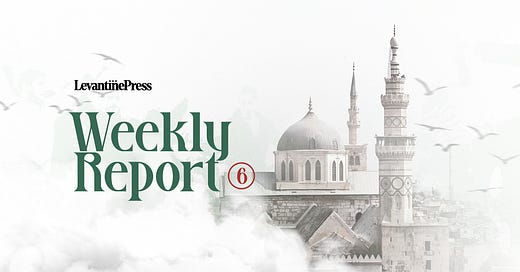Syria Weekly Report #6
Week beginning 13/01/25: updates on Syria's political transition, economy & infrastructure, foreign policy, security, and more.
State-building & Political Transition
Ali Keda has been appointed interim Minister of Interior in the transitional government, replacing Muhammad Abdul Rahman who is now Governor of Idlib. Keda was instrumental in the creation and development of the Syrian Salvation Government in Idlib, which became the nucleus for Syria’s post-Assad government. Until now he has occupied an unofficial ‘chief of staff’ role and has been present in all ministerial and international delegations with Ahmad Al-Shara in Damascus. Alongside As’ad Al-Shaybani and Anas Khattab, Keda is a key man in Ahmad Al-Shara’s ‘inner circle’ architecting the new Syrian state.
Economy & Infrastructure
News agencies have been interviewing several ministers, providing us with a better look ‘under-the-cover’ on policy issues facing the transitional government:
Reuters interviewed Syria’s new Central Bank governor, Maysaa Sabreen, discussing the Bank’s ongoing effort to tackle inflation and stabilise Syria’s currency (the Lira), her advocacy for the Bank’s independence in setting monetary policy, and expanding ‘Islamic banking’ to more Syrians. Sabreen is a rare example of a technocrat who served under the Assad regime and was promoted after its overthrow by the new government in Damascus.
CNBC Arabia interviewed Umar Shaqruq, Minister for Electricity, who stated that returning to pre-2010 electricity generation levels in Syria will ‘take three years and requires a cost of up to $40 billion to restore the networks.’
CNBC Arabia interviewed Ghiyath Diab, who was last week appointed as Syria’s Minister of Oil and Mineral Resources, and is the first Syrian of Palestinian origin to reach a cabinet-level position in Syria’s 76-year history. In the interview, Diab discussed Syria’s current struggle as oil and gas production has plummeted to a fraction of its pre-war level, Russian and Iranian shipments stopped coming after the fall of the Assad regime, and much of Syria’s energy resources are currently under PKK-SDF occupation in the north-east of the country. Diab stated that the ministry is conducting studies to modernise Syria’s energy production infrastructure and begin exploration efforts in Syrian waters in the Mediterranean.
CNBC Arabia interviewed Basil Abdul Hannan, Minister of Economy and Foreign Trade. He discussed the Central Bank’s efforts under governor Sabreen to stabilise the Lira’s exchange rate, and that the currency will not be changed in the near term. He also discussed the need to lift sanctions to boost incomes, with $120 a month being the minimum needed for a decent life. Abdul Hannan expects Syria’s economy to grow by more than 1% in 2025 after thirteen years of contraction. Crucially, Abdul Hannan dismissed claims of secret settlements with businessmen connected to the Assad regime, instead outlining the government’s work to compile smuggled funds estimated in the hundreds of billions of dollars stolen from Syria by these businessmen.
Foreign Affairs
There is an underestimation of just how fast Syria’s new government is ‘normalising’ (or becoming normalised) on the international stage, and much of this is owed to the remarkable level of statesmanship being shown by Syria’s new leadership. Foreign minister As’ad Al-Shaybani’s diplomatic strategy with the Gulf Arab states, particularly Saudi Arabia, is looking to pay off with Saudi Arabia possibly acting as Syria’s intercessor with the incoming Trump administration. High on the agenda will be sanctions relief and Israeli aggression in south Syria.
Syria is treading firmer ground now, and Al-Shaybani has made a number of statements on Israel’s violation of Syrian territory in Quneitra province, with increasing support from the UN, Saudi Arabia, Turkiye, and Qatar. Syria cannot afford to be goaded into a new war with Israel and instead seeks to solve the issue through multilateral cooperation and diplomacy. Several foreign delegations to Damascus this week show this steady evolution in Syria’s foreign policy as the government has moved from meeting neighbouring and regional states to also meeting with representatives from global institutions.
On January 15th, Germany’s development minister Svenja Schulze visited Damascus and met with Syria’s interim minister of health Maher Al-Shara, discussing German support for Syria’s healthcare system, increasing ties between German and Syrian hospitals, and training programs and visitations between German and Syrian doctors.
On January 16th, Spain’s foreign minister Jose Manuel Albares visited Damascus and re-opened the Spanish embassy.
On January 16th, Qatar’s foreign minister Muhammad bin Abdulrahman Al-Thani visited Damascus and discussed efforts to lift sanctions on Syria, condemned Israel’s invasion of Quneitra province, and highlighted Qatar’s efforts to help Syria with its energy crisis, including the delivery of energy ships.
On January 16th, a Japanese delegation visited Damascus, led by Ando Toshihide, Assistant Minister of the Middle Eastern and African Affairs Bureau in Japan’s Ministry of Foreign Affairs.
On January 17th, The International Criminal Court’s chief prosecutor, Karim Khan, visited Damascus to meet with Ahmad Al-Shara and members of the transitional government, and discuss how to bring members of the Assad regime to justice. Under the Assads, Syria was not a signatory to ICC conventions. It is possible that Syria may join the ICC in the near future as part of the pursuit of members of the regime.
On January 17th, a European Commission delegation visited Damascus, led by Hadja Lahbib, Commissioner for Equality, Preparedness and Crisis Management. Lahbib stated that the EU will assign €235 million for reconstruction in the region, with €142 million earmarked for Syria.
On January 18th, the Arab League sent a delegation led by Mr. Hossam Zaki, Assistant Secretary-General and Personal Representative of the Secretary-General of the Arab League. Zaki affirmed the Arab League’s commitment to Syria’s sovereignty and that the League would apply pressure to aid in lifting sanctions on Syria.
On January 19th, Norway’s foreign minister Espen Barth Eide visited Damascus.
On January 16th, foreign minister As’ad Al-Shaybani, intelligence minister Anas Khattab, and defense minister Marhaf Abu Qasra led a Syrian delegation to Ankara, Turkiye, to meet with their counterparts in the Turkish government and the President Recep Tayyip Erdogan. This has been the second major international visit by the transitional government after their tour of the Gulf Arab states. Turkiye is arguably Syria’s most important strategic partner on a number of bilateral issues, not restricted to: state-building, trade, energy, intelligence, and security. All these issues and more were on the agenda in Ankara, with President Erdogan affirming Syria’s territorial integrity and support for Syria’s security.
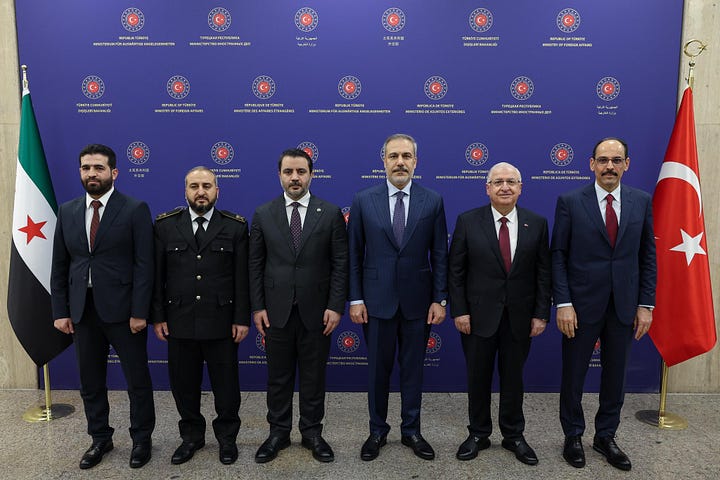
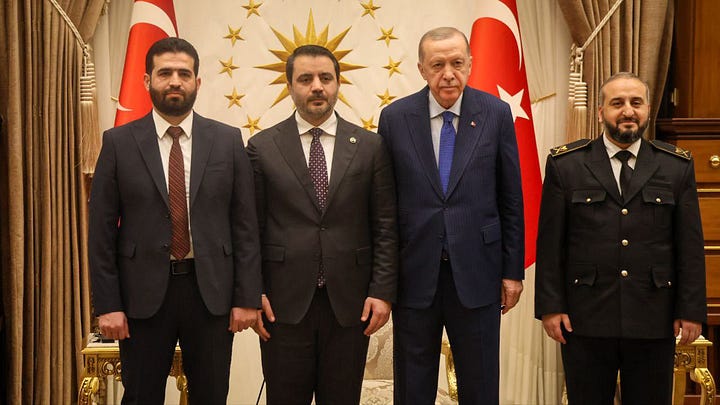
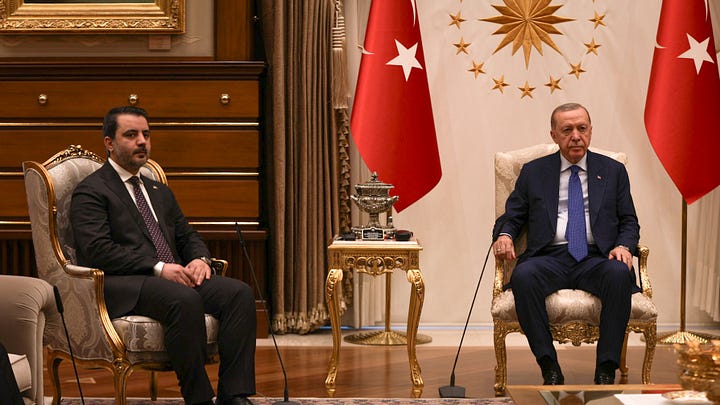
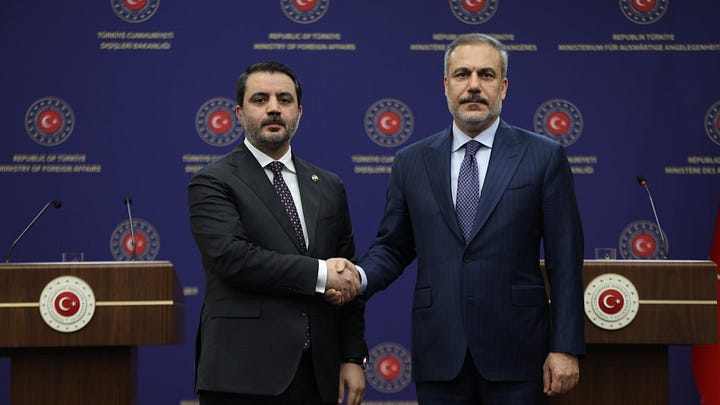
Security
Israel:
On January 15th, Israel significantly escalated tensions after it launched airstrikes on occupied Quneitra in south Syria. The airstrikes reportedly killed the mayor of the town of Ghadir Al-Bustan Abdul-Koma Abu Yasir, and two men from the interior ministry’s general security forces. Israel’s reasoning was that they were part of a heavily armed convoy, but the interior ministry confirmed that this convoy was conducting weapons’ collection among civilians in Quneitra. Earlier in the day, general security had prevented an Israeli column from advancing deeper into Syrian territory and forced it to turn back, and there continues to be quiet forms of confrontation as Damascus starts to assert itself on the ground and gain more support on the international stage.
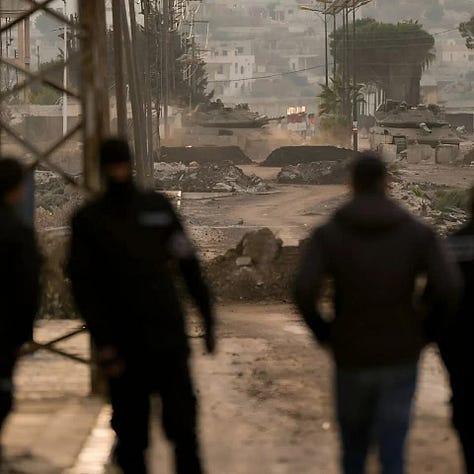
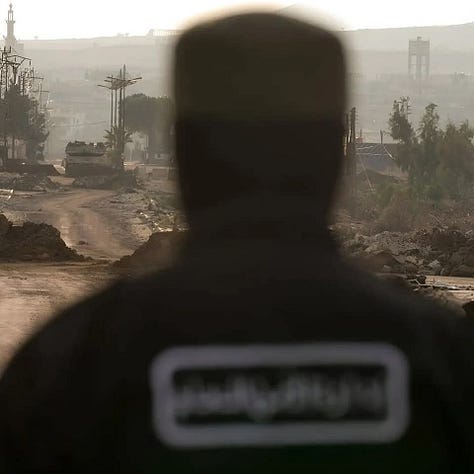
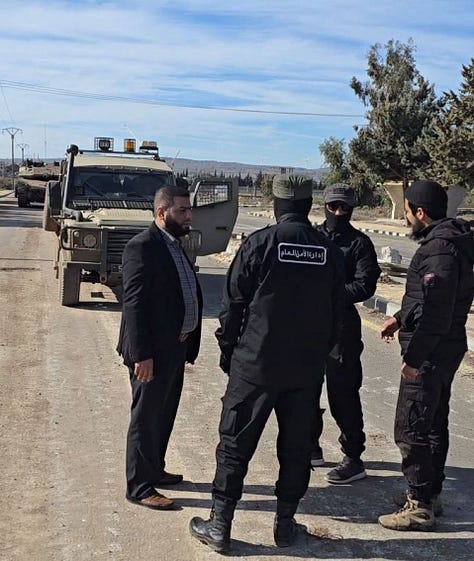
General security issues:
The interior ministry continues to conduct daily ‘combing operations’ in cities across Syria to capture Assad loyalists and informants, who are estimated to be in the tens of thousands of individuals now in hiding across Syria. They have either been exempted by the government from receiving an amnesty owing to prior war crimes or refused to take the amnesty.
The interior ministry’s anti-narcotics department continues to locate and destroy huge amounts of captagon that keep being found across Syria, highlighting the scale of the Assad narco-state. The latest bust on a captagon facility was for hiding captagon in children’s toys to pass through exports.
Kidnapping gangs and general theft is rampant in areas that were formerly held by the regime, with security forces launching daily ‘rescues’ to find and release hostages and arrest kidnappers. Unfortunately, there has been insufficient reporting on these issues, with most news spreading through local networks and media channels.
The interior ministry continues to combat smuggling on the Syrian-Lebanese border, with a bust this week on a weapons shipment including surveillance drones, launchers, and rifles moving from Tartus province to Lebanon. In recent weeks, gangs linked to Hezbollah have crossed the Syrian border and engaged in skirmishes with the interior ministry’s security forces. Under the Assad regime, Syria became a key part of Iran’s bridge to Hezbollah, with the Syrian-Lebanese border rife with the trafficking of people, weapons, and drugs. One of the interior ministry’s key challenges is to take control of the border.
Link Dump
Syria flooded with Pepsi and Pringles as rulers open economy ($)
Syria’s energy sector and its impact on stability and regional developments


